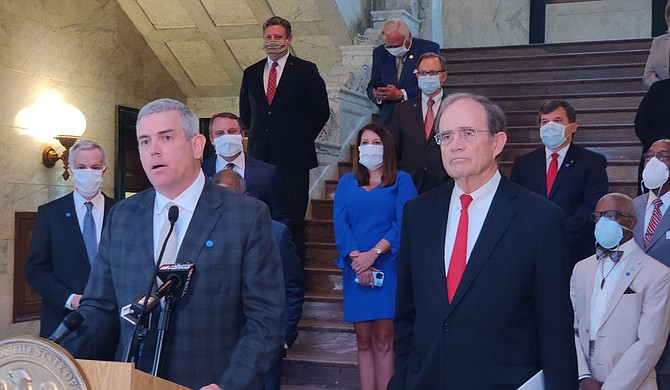Republican House Speaker Philip Gunn is chairman of the 14-member Budget Committee. He said the proposal released Monday is a starting point for budget discussions that will happen during the three-month legislative session that begins in early January. Photo by Nick Judin
JACKSON, Miss. (AP) — Top Mississippi legislators on Monday released their first budget recommendations for the year that begins July 1. They propose spending cuts for universities, community colleges, prisons, mental health and child protection services.
The Joint Legislative Budget Committee also proposes cutting elementary and secondary school spending, but that cut might not become reality when a final budget is adopted.
There's uncertainty now about how to award incentive pay to teachers in schools that are either high-performing or that have shown improvement. Incentive pay is usually based on school assessments, but those assessments have been put on hold during the coronavirus pandemic.
The budget proposal released Monday does not include the incentive pay in the education budget. But, the incentive pay plan has widespread support in the Legislature, and the budget proposal includes unallocated money that could be used for incentive pay after legislators figure out who would be eligible.
Republican House Speaker Philip Gunn is chairman of the 14-member Budget Committee. He said the proposal released Monday is a starting point for budget discussions that will happen during the three-month legislative session that begins in early January.
The committee proposes just over $6.1 billion in state spending. That is about $197.4 million less than the state is spending during the current fiscal year — roughly a 3.2% reduction.
The proposal would leave about $877.5 million in unspent money.
“It is a solid budget,” Gunn said. “It is responsible. It is staying within our means.”
If legislators stick to their schedule, all 122 House members and 52 senators will have a chance to vote on a final budget by early April.
Plans could change significantly before a final budget it set. Republican Lt. Gov. Delbert Hosemann said, for example, that he will push for a teacher pay raise that is not included in the initial proposal.
Republican Gov. Tate Reeves released his own budget recommendations last month. He's asking legislators to phase out the individual income tax by 2030, saying the change would make Mississippi more competitive. Gunn said Monday that legislators could consider that idea.
The individual income tax is one of the largest sources of Mississippi tax collections.
Copyright Associated Press. All rights reserved. This material may not be published, broadcast, rewritten, or redistributed.



Comments
Use the comment form below to begin a discussion about this content.
comments powered by Disqus